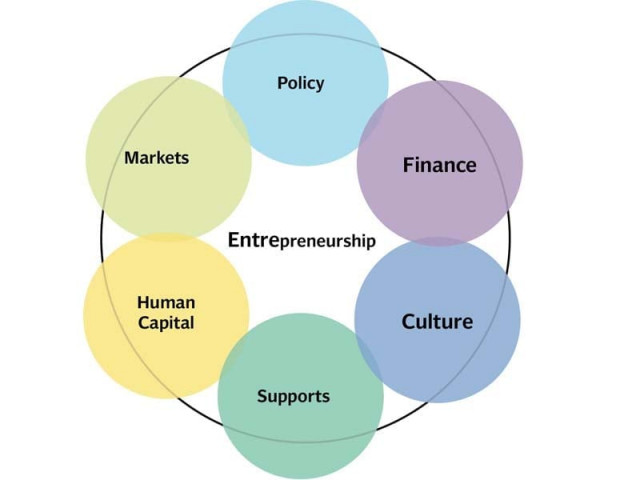Small and medium enterprises, the path towards growth
Government must focus on policies to nurture economic ecosystem

SOURCE: DANIEL ISENBERG, PROFESSOR OF ENTREPRENEURSHIP PRACTICE AT BABSON COLLEGE
Even in the final communiqué of the G20 Leaders’ Summit in Brisbane Australia (November 2014), the leaders stated their firm commitment to lift economic growth and help job creation by supporting competition, entrepreneurship and innovation. They also unanimously agreed to act together to lift growth and create jobs particularly in the SME sectors.
Addressing the issue
Unfortunately in Pakistan, World Bank’s ‘Doing Business’ indicators plummeted after 2006 from 60th position to 75th by 2010 and further plunged to 128th in 2015.
Clearly, there has been a lack of focus by successive governments on this front and as a consequence, new start-ups are at an all-time low and existing businesses are struggling.
The encouraging news is that this week, Federal Minister for Finance Ishaq Dar has constituted a committee to help improve Pakistan’s ratings on the ‘Doing Business’ Index as well as broadening of the tax base. To make this committee effective and focused, it is reassuring to see that it has been chaired by a reputable leader of the private sector – Gul Ahmed Group Chairman and Pakistan Business Council Member Bashir Ali Mohammad.
Entrepreneurship and innovation are essential concepts to help catalyse economic growth of any country. In most developed countries, both of these have been a common subject in government policies since the early 70’s.
We, on the other hand, have not made any inroads towards internalising them; hence, it is important that our government must include steps to encourage entrepreneurship and innovation in their policy documents. Considering SMEs and not large companies will drive growth, it is vital that our government focuses on the creation of a strong and vibrant entrepreneurship ecosystem.
Government’s role
As per Daniel Isenberg, professor of entrepreneurship practice at Babson College, the ecosystem consists of hundreds of elements but for convenience they are grouped into six major elements, namely: an encouraging culture, empowering policies, access to finance, quality human capital, accessible and vibrant markets for products, and a range of institutional and infrastructural supports.
The role of the government is imperative in creating this ecosystem. For starters, they need to be much more involved in understanding the existing dynamics and challenges of new start-ups, keeping their finger on the pulse, promulgating regulations and policies that help new businesses to breathe and for existing businesses to sustain.
Government’s involvement should be more of a facilitator than of making direct intervention into the firm’s business model.
There is no need to over-engineer the ecosystem but to let it evolve in its own natural way and be always available to help remove any obstacles and to oversee its development.
Initiatives by the government must take into account, depending on the industry and sector, tax incentives, minimal red tape, business incubators, grants, vocational training, technology transfer, market access and infrastructural support.
Many pundits feel that we should try to emulate or create our own version of Silicon Valley in the United States or Bangalore in India. This is unlikely to succeed as these two came into existence as a result of their own unique dynamics of culture and demographics. It would be better to base our ecosystem on local conditions and expertise rather than trying to import or emulate a foreign success model.
Although a fundamental element of this ecosystem is ‘access to finance’ but one needs to be careful not to flood the system with ‘easy money’. It is imperative to build a strong business community, with mentors and advisers preferably from the private sector and inculcate value for money and strong focus on return on investment. Early local successes will help significantly to act as role models and to encourage others to venture this way.
Effective regulations and policies can be created only if ministers and bureaucrats work diligently with the private sector, academicians and successful entrepreneurs. It must address each elements of the ecosystem and incorporate technological solutions to improve productivity and create efficiency. The policy should be broad-based and not just focused on a few sectors. Efforts should be more on growing our indigenous industries and not green-field investments.
Finally, government’s bias should be more towards removing obstacles rather than holding hands and assuring their success. This would require them to address infrastructural challenges (energy, logistics), create a level-playing field (no special favour to any one entity), reduce bureaucracy and streamlining processes (red tape), easy access to foreign markets (free trade agreements), qualified human capital (education and vocational training) and attractive taxation structure specially for small firms to reduce their financial burden and improve their sustainability odds.
The writer is an entrepreneur and a supporter of many social enterprises and foundations.
Published in The Express Tribune, June 1st, 2015.
Like Business on Facebook, follow @TribuneBiz on Twitter to stay informed and join in the conversation.



















COMMENTS
Comments are moderated and generally will be posted if they are on-topic and not abusive.
For more information, please see our Comments FAQ